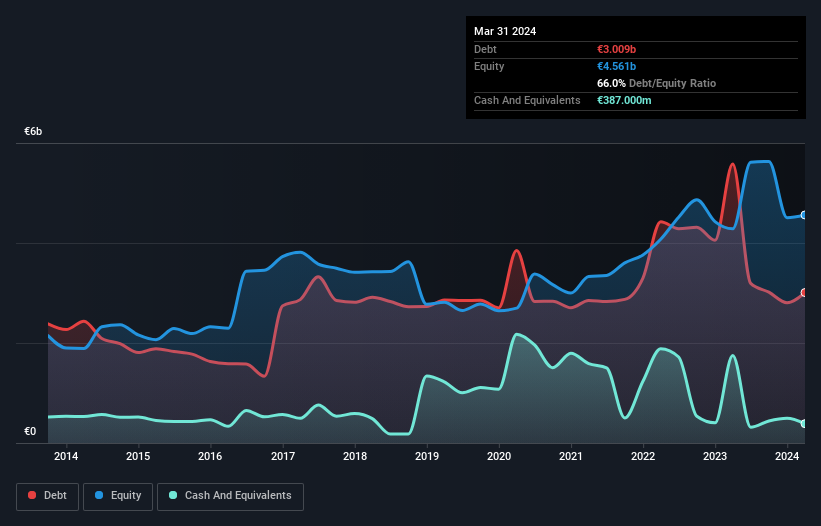Warren Buffett famously said, 'Volatility is far from synonymous with risk.' When we think about how risky a company is, we always like to look at its use of debt, since debt overload can lead to ruin. Importantly, LANXESS Aktiengesellschaft (ETR:LXS) does carry debt. But should shareholders be worried about its use of debt?
When Is Debt A Problem?
Generally speaking, debt only becomes a real problem when a company can't easily pay it off, either by raising capital or with its own cash flow. If things get really bad, the lenders can take control of the business. However, a more usual (but still expensive) situation is where a company must dilute shareholders at a cheap share price simply to get debt under control. Having said that, the most common situation is where a company manages its debt reasonably well - and to its own advantage. When we think about a company's use of debt, we first look at cash and debt together.
Check out our latest analysis for LANXESS
What Is LANXESS's Debt?
The image below, which you can click on for greater detail, shows that LANXESS had debt of €3.01b at the end of March 2024, a reduction from €5.58b over a year. However, because it has a cash reserve of €387.0m, its net debt is less, at about €2.62b.

A Look At LANXESS' Liabilities
Zooming in on the latest balance sheet data, we can see that LANXESS had liabilities of €1.20b due within 12 months and liabilities of €3.95b due beyond that. Offsetting this, it had €387.0m in cash and €855.0m in receivables that were due within 12 months. So its liabilities total €3.91b more than the combination of its cash and short-term receivables.
The deficiency here weighs heavily on the €2.19b company itself, as if a child were struggling under the weight of an enormous back-pack full of books, his sports gear, and a trumpet. So we'd watch its balance sheet closely, without a doubt. After all, LANXESS would likely require a major re-capitalisation if it had to pay its creditors today. There's no doubt that we learn most about debt from the balance sheet. But it is future earnings, more than anything, that will determine LANXESS's ability to maintain a healthy balance sheet going forward. So if you want to see what the professionals think, you might find this free report on analyst profit forecasts to be interesting.
In the last year LANXESS had a loss before interest and tax, and actually shrunk its revenue by 20%, to €6.4b. That makes us nervous, to say the least.
Caveat Emptor
Not only did LANXESS's revenue slip over the last twelve months, but it also produced negative earnings before interest and tax (EBIT). Indeed, it lost €172m at the EBIT level. When we look at that alongside the significant liabilities, we're not particularly confident about the company. It would need to improve its operations quickly for us to be interested in it. For example, we would not want to see a repeat of last year's loss of €951m. In the meantime, we consider the stock to be risky. When analysing debt levels, the balance sheet is the obvious place to start. However, not all investment risk resides within the balance sheet - far from it. To that end, you should be aware of the 1 warning sign we've spotted with LANXESS .
Of course, if you're the type of investor who prefers buying stocks without the burden of debt, then don't hesitate to discover our exclusive list of net cash growth stocks, today.
New: AI Stock Screener & Alerts
Our new AI Stock Screener scans the market every day to uncover opportunities.
• Dividend Powerhouses (3%+ Yield)
• Undervalued Small Caps with Insider Buying
• High growth Tech and AI Companies
Or build your own from over 50 metrics.
Have feedback on this article? Concerned about the content? Get in touch with us directly. Alternatively, email editorial-team (at) simplywallst.com.
This article by Simply Wall St is general in nature. We provide commentary based on historical data and analyst forecasts only using an unbiased methodology and our articles are not intended to be financial advice. It does not constitute a recommendation to buy or sell any stock, and does not take account of your objectives, or your financial situation. We aim to bring you long-term focused analysis driven by fundamental data. Note that our analysis may not factor in the latest price-sensitive company announcements or qualitative material. Simply Wall St has no position in any stocks mentioned.
Have feedback on this article? Concerned about the content? Get in touch with us directly. Alternatively, email editorial-team@simplywallst.com
About XTRA:LXS
LANXESS
A specialty chemicals company, engages in the development, manufacture, and marketing of chemical intermediates, additives, and consumer protection products worldwide.
Undervalued with moderate growth potential.
Similar Companies
Market Insights
Community Narratives



